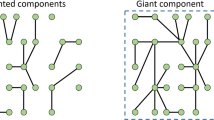Abstract
Computing technology is clearly a technical revolution but will most probably bring about a cultural revolution as well. The effects of this technology on human culture will be dramatic and far-reaching. Yet, computers and electronic networks are but the latest development in a long history of cognitive tools, such as writing and printing. We will examine this history, which exhibits long-term trends toward an increasing democratization of culture, before turning to today’s technology. Within this framework, we will analyze the probable effects of computing on culture: dynamical representations, generalized networking, constant modification and reproduction. To address the problems posed by this new technical environment, we will suggest possible remedies. In particular, the role of social institutions will be discussed, and we will outline the shape of new electronic institutions able to deal with the information flow on the internet.
Similar content being viewed by others
References
Adomavicius G, Tuzhilin A (2005) Toward the next generation of recommender systems: a survey of the state-of-the-art and possible extensions. IEEE Trans Knowl Data Eng 17(6):734–749
Berger PL, Luckmann T (1966) The social construction of reality: a treatise in the sociology of knowledge. Anchor Books, New York
Burke P (1998) The European renaissance: centre and peripheries. Blackwell, Oxford
Carruthers P, Boucher J (eds) (1998) Language and thought: interdisciplinary theme. Cambridge University Press, Cambridge
Cattuto C (2006) Semiotic dynamics in online social communities. Eur Phys J C 46:33–37
Eisenstein E (1983) The printing revolution in early modern Europe. Cambridge University Press, Cambridge
Feller J, Fitzgerald B, Hissam SA, Lakhani KR (eds) (2005) Perspectives on free and open source software. MIT Press, Cambridge
Gelb IJ (1963) A study of writing. University of Chicago Press, Chicago
Golder SA, Huberman BA (2006) The structure of collaborative tagging systems. J Inf Sci 32(2):198–208
Innis H (1950) Empire and communications. Oxford University Press, Oxford
Innis H (1951) The bias of communication. University of Toronto Press, Toronto
Johnson P (2000) The renaissance: a short history. Modern Publishing, China
Lévy P (1990) Les Technologies de l’Intelligence. La Découverte, France
McLuhan M (1962) The Gutenberg galaxy. University of Toronto Press, Toronto
McLuhan M (1964) Understanding media: the extensions of man. MIT Press, Cambridge
Memmi D (2006) The nature of virtual communities. AI Soc 20(3):288–300
Nora S, Minc A (1978) L’Informatisation de la Société. La Documentation Française, France
Rüegg W (ed) (1992) A history of the university in Europe. Cambridge University Press, Cambridge
Sampson G (1985) Writing systems. Stanford University Press, Stanford
Verger J (1973) Les Universités au Moyen Age. PUF, France
Vygotsky L (1962) Thought and language. MIT Press, Cambridge
Author information
Authors and Affiliations
Corresponding author
Rights and permissions
About this article
Cite this article
Memmi, D. Cultural consequences of computing technology. AI & Soc 28, 77–85 (2013). https://doi.org/10.1007/s00146-012-0398-y
Received:
Accepted:
Published:
Issue Date:
DOI: https://doi.org/10.1007/s00146-012-0398-y




